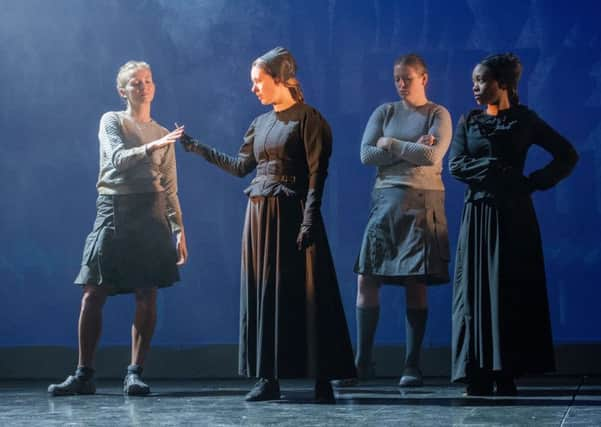Theatre review: The Divide Parts 1 & 2


King’s Theatre
****
And the trouble with that central idea is that it is so often true, even in our own supposedly equal society, that – as in Margaret Attwood’s Handmaid’s Tale – it’s frighteningly easy to see how we could slip back into a world where the powerful fear and hatred of women that still so haunts the internet could once again begin to shape the physical reality of our lives.
In Ayckbourn’s vision of England 100 years from now, the idea of mutual harm has been made real by a plague that has killed all but a tiny fraction of the population, leaving women as immune carriers of the disease, and men as potential victims. The result is a society in which men and women live strictly divided lives in different areas, the men dressed in white to signal their purity, the women in black to signal their moral inferiority. Heterosexual relations are taboo; and the only people who inhabit a “grey zone” are the children, including our brilliant young writer heroine Soween, aged 9, at the start of the story, and her slightly older brother Elihu.
Advertisement
Hide AdAdvertisement
Hide AdIt’s Ayckbourn’s wonderful gift, as a playwright, to take this post-apocalyptic society – with its intense female couples, compulsory ideology, and puritanical rules of conduct – and make it seem, through the eyes of these children, both completely human and recognisable, and often very funny. And such is his brilliant, passionate feminism, visible throughout his career, that if he makes the world of the women seem richly flawed and human, he subtly manages, mainly through the character of Elihu’s troubled tutor Rudgren, to convey a sense that the men’s world across the barrier is much worse, a joyless place of violence, heavy drinking, and forbidden heterosexual porn.
All of this is captured with a fine, lyrical narrative energy in Annabel Bolton’s Old Vic production, a large-scale spectacle featuring a brilliant mostly-female acting ensemble of 13, many unforgettable stage images, and an on-stage band and large community choir performing an exquisite score by Christopher Nightingale. Ayckbourn’s huge narrative loses some of its structural tightness in the second half, when Soween becomes a helpless bystander to the forbidden love affair between Elihu and her friend Giella; and the show’s long final half-hour is simply unnecessary, telling us nothing that’s not already implicit in the story.
Yet The Divide remains an unforgettable experience, not least for Erin Doherty’s enthralling and absolutely beautiful central performance as Soween. “I want to write like Charlotte,” she says, when Giella first gives her a forbidden copy of Jane Eyre. And though some may dismiss Ayckbourn’s final celebration of the creative human spirit as too romantic, others will admire the courage of his intense belief in the human and the humane; in a time when we need that positive vision, perhaps more than ever before.
Until 20 August. Tomorrow 7:30pm.